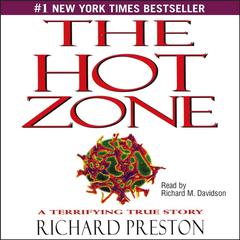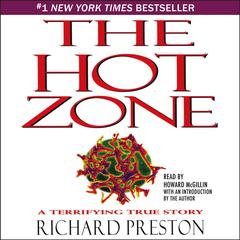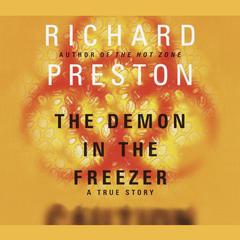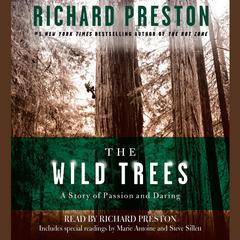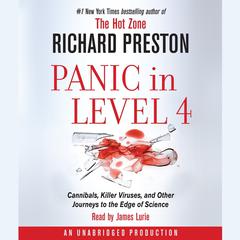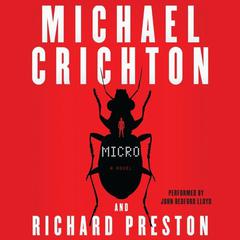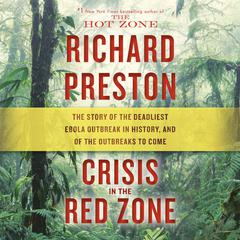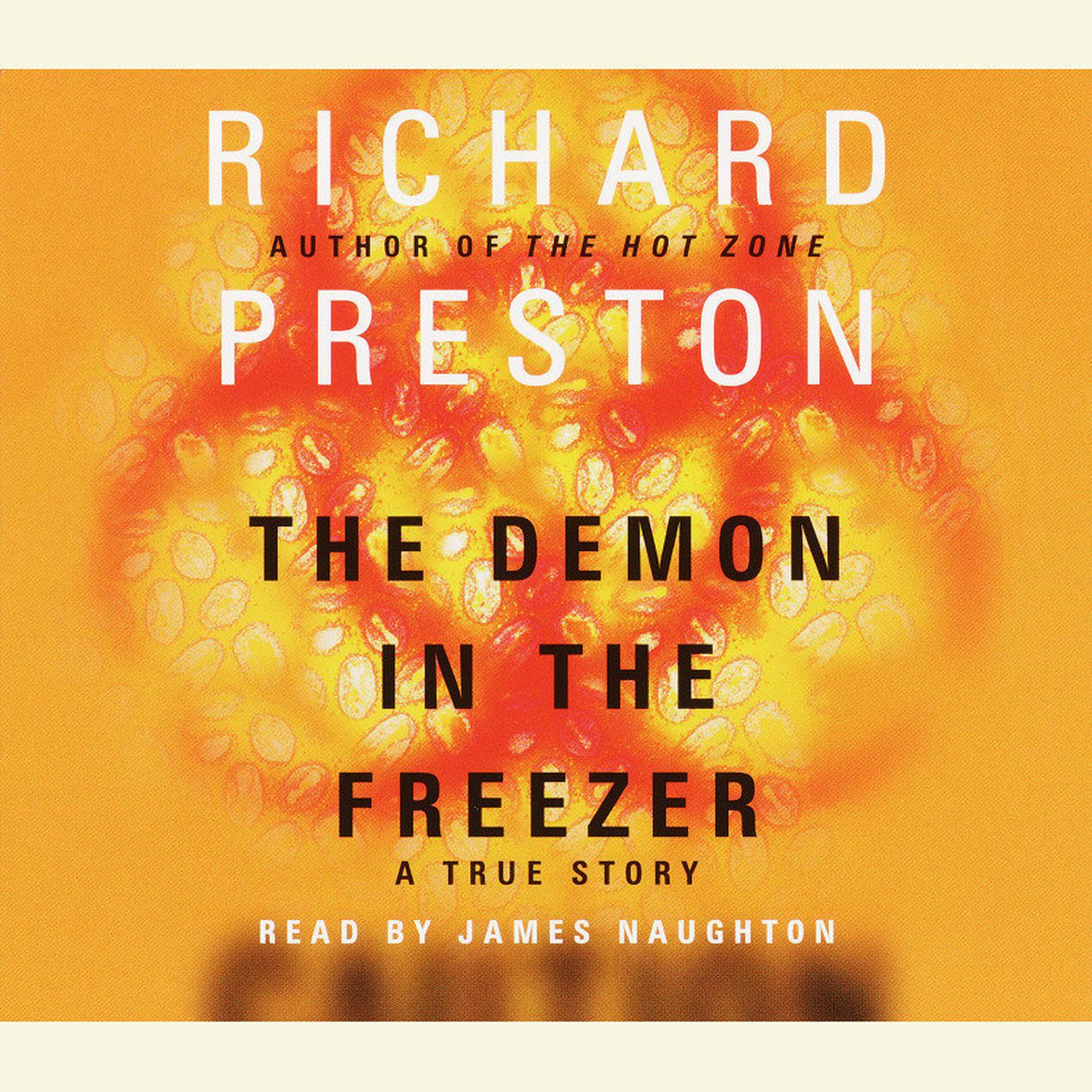 Play Audiobook Sample
Play Audiobook Sample
The Demon in the Freezer (Abridged): A True Story Audiobook
 Play Audiobook Sample
Play Audiobook Sample
Quick Stats About this Audiobook
Total Audiobook Chapters:
Longest Chapter Length:
Shortest Chapter Length:
Average Chapter Length:
Audiobooks by this Author:
Publisher Description
“The bard of biological weapons captures the drama of the front lines.”—Richard Danzig, former secretary of the navy The first major bioterror event in the United States-the anthrax attacks in October 2001-was a clarion call for scientists who work with “hot” agents to find ways of protecting civilian populations against biological weapons. In The Demon in the Freezer, his first nonfiction book since The Hot Zone, a #1 New York Times bestseller, Richard Preston takes us into the heart of Usamriid, the United States Army Medical Research Institute of Infectious Diseases at Fort Detrick, Maryland, once the headquarters of the U.S. biological weapons program and now the epicenter of national biodefense. Peter Jahrling, the top scientist at Usamriid, a wry virologist who cut his teeth on Ebola, one of the world’s most lethal emerging viruses, has ORCON security clearance that gives him access to top secret information on bioweapons. His most urgent priority is to develop a drug that will take on smallpox-and win. Eradicated from the planet in 1979 in one of the great triumphs of modern science, the smallpox virus now resides, officially, in only two high-security freezers-at the Centers for Disease Control in Atlanta and in Siberia, at a Russian virology institute called Vector. But the demon in the freezer has been set loose. It is almost certain that illegal stocks are in the possession of hostile states, including Iraq and North Korea. Jahrling is haunted by the thought that biologists in secret labs are using genetic engineering to create a new superpox virus, a smallpox resistant to all vaccines. Usamriid went into a state of Delta Alert on September 11 and activated its emergency response teams when the first anthrax letters were opened in New York and Washington, D.C. Preston reports, in unprecedented detail, on the government’ s response to the attacks and takes us into the ongoing FBI investigation. His story is based on interviews with top-level FBI agents and with Dr. Steven Hatfill. Jahrling is leading a team of scientists doing controversial experiments with live smallpox virus at CDC. Preston takes us into the lab where Jahrling is reawakening smallpox and explains, with cool and devastating precision, what may be at stake if his last bold experiment fails.
Download and start listening now!
"This books is Richard Preston's second best, the first being The Hot Zone. It describes not only the threat of smallpox and history of smallpox in detail, but also the different types of smallpox that are possible. He obviously did some research over a long period of time in order to come up with the facts that he did. Originally, I think the book was meant to be written to describe smallpox, but during the writing of the book, 9-11 occurred and he goes on to talk about the anthrax threats that occurred after 9-11 as well as other biological threats received after 9-11. I recommend this book to anyone who's ever been interested in learning more about biological warfare."
— Avel (5 out of 5 stars)
Quotes
-
“[Blends] terror, technology, and trivia…[Preston] has probably done more than any other writer to establish a nationwide imperative to think about infectious agents as global threats and potential weapons.”
— New York Times Book Review -
“Preston uses his considerable storytelling skills to show us the heroes who fought smallpox, not for money or glory but simply because they wanted to leave behind a better world than they had found.”
— Dallas Morning News -
“Vivid testimony…The alarms he raises are real ones…With his genius for vivid detail and telling anecdote, Preston adds frissons of his own…His real métier lies in intimate and exhaustive interviews with experts on the front line.”
— Newsday -
“Riveting…Better-than-fiction characters…Preston had terrific access to people and the facilities typically off-limits.”
— Atlanta Journal-Constitution -
“Preston captivates…A frighteningly real account of the virus and its potential to explode globally.”
— Cleveland Plain Dealer -
“Compelling…Preston charts the tragic miscalculations and the geopolitical maneuvers that led from the triumph of eradication to the possible threat of a deliberate epidemic…Preston is a master at explaining what’s important…A reminder of the lifesaving promise of global cooperation.”
— San Jose Mercury News -
“Lyrical as well as explanatory…Preston is a helpful guide, translating complex scientific situations into everyday language.”
— St. Louis Post-Dispatch -
“Riveting…Startling new insights into the government’s reaction to the anthrax mailings.”
— Hartford Courant
Awards
-
A New York Times bestseller
-
A 2002 Los Angeles Times Book Prize Nominee for Science and Technology
The Demon in the Freezer Listener Reviews
-
" Very interesting and well written book "
— Katie, 2/19/2014 -
" Preston raises awareness about disease and bioterrorist threats in a way that doesn't simply terrorize, but educates and motivates. He tells a compelling story, does meticulous research, and is doing a great public service by doing homework we all need to know about. "
— Marilyn, 2/17/2014 -
" Holy moley, this book was terrifying. Scary thing is, this book came out in 2002. Much more has happened surrounding this topic since then (as was outlined in my virology class). Even scarier, though, is the fact that it's all true. Studying microbiology as I do, I lose sleep over things like this. Always the 'What If?' that gets to me. Anyway, very good book. Well written, terrifying, and very enlightening. "
— Devin, 2/2/2014 -
" This was a very interesting history of smallpox. It also had a very interesting look into issues of biowarfare. I think it was definitely worth the read. My only complaint is that I was a little confused by all the anthrax stuff at the beginning. If I were to read it again, I would start at the chapter that talks about the history of smallpox, rather than starting at the beginning. "
— Eric, 1/30/2014 -
" Another great biological weapons book. Smallpox virus is the main focus. "
— Jeff, 1/20/2014 -
" Very interesting book if you like reading about history and microbiology. Preston did a good job researching the topic. I found it cool to learn what our government does/doesn't do in light of bioterrorist attacks. "
— Jenna, 1/10/2014 -
" Great read about the eradication of smallpox and the resistance to destroy the remaining stocks. "
— Charley, 1/7/2014 -
" not as good as the hot zone. covers anthrax and small pox. "
— Joy, 1/3/2014 -
" I hated it, don't read it, it was sooooo boring.... "
— Kimberly, 1/2/2014 -
" Not as good as his previous works. It was interesting and informative. "
— Lori, 12/26/2013 -
" I love virus stuff so this was a slam dunk. "
— carl, 12/7/2013 -
" Very informative but not so suspenseful. "
— Kelly, 10/5/2013 -
" This was an excellent insight into smallpox and anthrax. Forget nuclear weapons - we should be concerned about biological warfare! Excellent read. "
— Camille, 8/4/2013 -
" What Hot Zone does for Ebola, Demon in the Freezer does for smallpox. "
— Mary, 8/3/2013 -
" Amazing! I cannot believe that people were using smallpox in live animal experients at the CDC the same day I was graduating from high school 90 miles away. "
— Alvin, 8/1/2013 -
" This was a short well written and terrifying book about the potential for biological terrorism. I read this in November 2002 at a time when everyone was worried about terrorism, war, anthrax, smallpox, and lots of other nasty things. It was an effective book. "
— Marks54, 5/17/2013 -
" This was a re-read. I liked it the first time, and again this time! I enjoyed Hot Zone and this one is on the same wavelength. "
— Plehigh, 2/28/2013 -
" It was pretty good. Really scary though, in the fact that it is real. I did get a bit bored with it after a little while. "
— Rebecca, 1/25/2013 -
" history and behavior of the smallpox virus and an account of the anthrax attacks of Sep 2001 "
— Salsadancer, 1/10/2013 -
" I knew going in to it that it would be documentary in nature, but it was very slow moving for me. Very eye-opening, but just a bit slower than I would like. "
— Limopilot, 10/8/2012 -
" Lacks good editing, but very informational (in a scientific but creepy kind of way...) "
— Elena, 7/19/2012 -
" his writing suffers the story, but I appreciate a documentary style. ill never wish for a per monkey again. "
— April, 5/31/2012 -
" Good read for history and intro. to bio-terrorism and virology. very sensational which makes it a page-turner. "
— Broc, 12/5/2011 -
" Wow, got this one from a science teacher friend's recommendation; didn't even realize it was non-fiction. Interesting book. The end slows down a bit but all in all I would highly recommend it. "
— Megan, 11/18/2011 -
" WOW... This is a true story and it is crazy. Very easy to read and a fast read. Good book after I get over what I just ready maybe I will read some more of his books. "
— Tieya, 10/1/2011 -
" I think I am never going into an African bat cave!!! "
— Roberta, 5/18/2011 -
" Quite gory but very interesting none the less. "
— Rp, 5/13/2011 -
" Life is good when you don't have Ebola. "
— Tammie, 5/12/2011 -
" terrifying and fascinating. I read this book years ago and suddenly thought of it while on today. "
— Holly, 5/11/2011 -
" Ok book. Not something I would recommend to others. The reading was lower level than I thought. "
— Angela, 5/10/2011 -
" One of, if not the scariest book I've read. Because it's true. If you are a germaphobe, don't read this book! "
— Mark, 5/8/2011 -
" Written with the layperson in mind, this is a terrifying read. How this tiny virus, if allowed to run amok, can decimate the human population, is extremely humbling. "
— Neida, 5/8/2011 -
" If you're enjoy real-life drama, this has plenty. I finished this in one sitting. "
— Roseanne, 4/28/2011 -
" Wow. This book was a lot better than I expected it to be. I hate reading books in school half of the time, but I was really drawn into this. It's definitely a scary thought, to think that something like Ebola exists, but it's a reasonable scary. Definitely recommend it! "
— Lauren, 4/27/2011 -
" I'm so so so glad the ending was boring. Read it for school. "
— Wendy, 4/25/2011 -
" WOW what a book! Read this the first semester of college and was just blown away by the truth of horrific strange viruses! "
— Valerie, 4/20/2011 -
" Read this one 17 years after it was hot - I bet it was amazing as a New Yorker piece - in the long form it fell a bit flat for me. "
— Ryan, 4/18/2011
About Richard Preston
Richard Preston is the author of the New York Times bestseller The Cobra Event and The Demon in the Freezer. A writer for the New Yorker since 1985, Preston won the American Institute of Physics Award and is the only nondoctor ever to have received the CDC’s Champion of Prevention Award. Preston attended Pomona College and recievied his PhD from Princeton University. He lives outside New York City.
About James Naughton
James Naughton is an actor and director. He first came to prominence in the television series adaptation of the Planet of the Apes movie series of the same name. Since then, he has starred in dozens television shows and appeared in numerous Broadway plays. He is a two-time Tony Award winner, one for his performance as Sam Spade in City of Angels and the other portraying Billy Flynn in the 1997 revival of Chicago.




